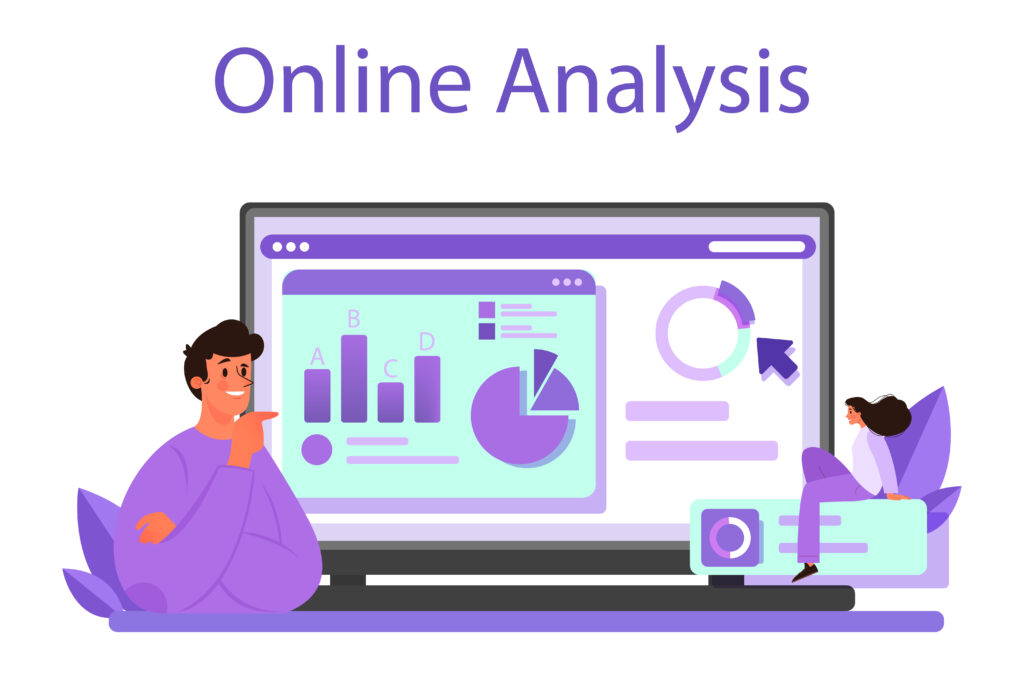
Key Takeaways
- Data-driven marketing for eCommerce means using information about how people shop online to make better decisions.
- Data-driven marketing tailors eCommerce experiences based on customer behaviors and preferences, fostering engagement and loyalty.
- Optimization of marketing strategies through data insights enhances ROI and drives growth in eCommerce.
- Data analysis improves conversion rates and user experiences by addressing barriers and tailoring email campaigns.
- Data-driven insights keep eCommerce businesses competitive, while personalization builds lasting customer loyalty.
In today’s fast-paced digital world, eCommerce businesses face a never-ending challenge to stand out from the crowd and win the hearts of their customers.
And the key to success? You guessed it: data-driven marketing.
Data-driven marketing is the secret weapon that eCommerce businesses can use to gain a competitive edge.
By collecting and analyzing data to gain valuable insights into their customers’ behaviors, preferences, and pain points.
Armed with this information, businesses can create targeted, personalized experiences that drive engagement, loyalty, and, of course, sales.
But what exactly does data-driven marketing mean for eCommerce businesses, and why is it so essential?
It’s simple: data-driven marketing means using customer data to optimize marketing strategies, from identifying new customer segments to creating personalized recommendations, and so much more.
With the right strategies and tools in place, eCommerce businesses can leverage the power of data to achieve their objectives and stay ahead of the competition.
So, whether you’re a seasoned eCommerce pro or just starting out, this guide will provide you with the insights and strategies you need to use data-driven marketing to improve your eCommerce outcomes.
From analyzing data to optimizing the sales funnel, you’ll learn how to use data to create personalized experiences, drive revenue growth, and build long-term customer loyalty.
What do you mean by data-driven marketing for eCommerce?
Data-driven marketing for eCommerce means using information about how people shop online to make better decisions.
It’s like looking at what customers do, like what they buy or look at, to figure out what they might like.
This helps online stores show the right products to people at the right time.
By using this information, stores can make customers happier, sell more things, and do well in online shopping.
Importance of data-driven marketing of eCommerce

1. Understanding customer behavior
By gathering and analyzing data, eCommerce businesses can gain a deep understanding of their customer’s behaviors, preferences, and pain points.
It allows businesses to create personalized experiences that resonate with customers and drive engagement, loyalty, and sales.
2. Optimizing marketing strategies
Data-driven marketing enables eCommerce businesses to optimize their marketing strategies.
They identify which channels, messages, and offers resonate best with their target audience.
Businesses can adjust their marketing efforts by leveraging data insights to improve ROI and drive growth.
3. Improving conversion rates
Data-driven marketing can help eCommerce businesses improve their conversion rates by identifying and addressing barriers to purchase, such as poor website design or a clunky checkout process.
Businesses can improve conversions and drive revenue growth by optimizing the user experience based on data insights.
4. Staying ahead of the competition
In today’s highly competitive eCommerce landscape, businesses that fail to leverage data-driven marketing risk falling behind their competitors.
By using data to identify trends, opportunities, and customer insights, businesses can stay ahead of the curve and remain competitive insight in the marketplace.
5. Building customer loyalty
By using data to create personalized experiences, eCommerce businesses can build long-term customer loyalty and increase customer lifetime value.
Orientation Marketing, a pharmaceutical marketing agency, states that there are two components of building customer loyalty: Over-delivery on your service/product promise and continually rewarding loyal and repeat customers.
By understanding what customers want and need, businesses can create targeted messaging, promotions, and recommendations that keep customers returning for more.
Objectives of using data-driven marketing in eCommerce
1. Increase sales and revenue
Using data to identify customer segments, preferences, and behavior, eCommerce businesses can create personalized experiences and targeted marketing campaigns that drive sales and revenue growth.
2. Improve customer retention
Data-driven marketing can help eCommerce businesses identify opportunities to improve customer retention and loyalty by creating personalized experiences and targeted messaging that keep customers engaged and returning for more.
3. Enhance the user experience
Data-driven marketing can help eCommerce businesses improve the user experience by identifying and addressing pain points, optimizing the checkout process, and creating personalized recommendations that enhance the customer journey.
Steps of how data-driven marketing eCommerce improves
1. Gathering Data for eCommerce Marketing

Identifying the data sources: To use data-driven marketing in eCommerce effectively, businesses need to identify the specific types of data they need to collect.
It may include customer demographics, purchase history, website traffic, email engagement, social media interactions, and more.
Identifying suitable data sources is critical to making informed marketing strategies and tactics decisions.
Collecting data from different channels: Once data sources have been identified, businesses must determine how to collect data from different channels.
This may involve using analytics tools such as Google Analytics, social media platforms like Facebook and Instagram, or email marketing software like Salesmate, Mailchimp or Constant Contact.
It’s essential to collect data consistently and accurately across all channels.
Managing and storing the data: Managing and storing data is a critical aspect of data-driven marketing in eCommerce.
A centralized database or a customer data platform (CDP) can help businesses integrate data from various sources, providing a unified view of customer behavior and preferences.
Storing data in a secure and accessible manner is also essential, as it ensures that the data is available when needed for analysis or marketing purposes.
Ensuring data accuracy: Data accuracy is critical to making informed decisions in eCommerce marketing.
Businesses should ensure that data is collected and stored accurately and that discrepancies are identified and resolved promptly.
This may involve implementing automated data quality checks or manually reviewing data regularly.
Using data to inform marketing strategies: The goal of gathering data for eCommerce marketing is to use it to inform marketing strategies and tactics.
By analyzing customer behavior data and other metrics, businesses can gain insights into what is working and what isn’t and adjust their marketing efforts accordingly.
Data-driven marketing can help businesses make informed decisions about product development, pricing, promotions, and more.
Keeping up with evolving data privacy regulations: As data-driven marketing becomes more prevalent in eCommerce, businesses must ensure that they are in compliance with evolving data privacy regulations.
This may involve implementing data security measures, obtaining customer consent for data collection, and ensuring that data is being used ethically and transparently.
2. Analyzing Data for eCommerce Marketing

Analyzing data is a critical component of data-driven marketing in eCommerce.
It helps businesses gain insights into customer behavior, measure the effectiveness of marketing efforts, and optimize strategies to improve outcomes.
Here are some additional details to consider:
Identifying key performance indicators (KPIs) to measure: In addition to the abovementioned KPIs, eCommerce businesses may also want to consider metrics such as cart abandonment rate, customer acquisition cost, and return on ad spend (ROAS).
By identifying the most relevant KPIs for their business, they can focus their data analysis efforts on the areas that matter most.
Using analytical tools: In addition to Google Analytics and Adobe Analytics, many other analytical tools are available to eCommerce businesses, including those that leverage server side tracking for more accurate data collection.
It also includes heat mapping tools, user testing software, and A/B testing platforms.
These customer insights tools can provide even more detailed insights into customer behavior and help businesses identify opportunities for improvement.
Applying data analysis to optimize marketing strategies: Data analysis can be used to optimize a wide range of marketing strategies, from email marketing campaigns to social media advertising.
By regularly analyzing data, businesses can better understand their customers and tailor their marketing efforts to their needs and preferences.
They can also identify opportunities to improve the customer experience and increase conversions.
A/B Testing: A/B testing involves creating two versions of a campaign or website and randomly assigning visitors to one of the two groups to see which version performs better.
By analyzing the results of the A/B test, eCommerce businesses can optimize their marketing strategies.
3. Personalizing the customer experience
Importance of personalization in eCommerce: Personalization is an essential component of successful eCommerce businesses.
With increasing competition and a growing number of options, customers expect a personalized experience.
Personalization helps businesses to differentiate themselves from their competitors, create deeper customer engagement, and ultimately drive sales.
Using customer data to create personalized experiences: To create personalized experiences, eCommerce businesses need to leverage customer data effectively.
This may involve using data to segment customers into different groups based on behavior or preferences and delivering targeted marketing messages and offers.
By using customer data effectively, businesses can better understand their customers and deliver the right message at the right time, leading to increased engagement and loyalty.
Implementing personalization strategies in eCommerce: There are many different ways to implement personalization strategies in eCommerce, including email marketing, website personalization, and product recommendations.
For example, personalized emails with tailored content and recommendations based on customer behavior can lead to higher open and click-through rates.
Similarly, personalized product recommendations can improve the customer experience and drive sales.
By using data to inform these strategies, eCommerce businesses can create a more personalized and engaging customer experience, leading to increased sales and customer loyalty.
4. Optimizing the eCommerce Sales Funnel

Defining the eCommerce sales funnel: The eCommerce sales funnel is a visual representation of the customer journey, from the initial awareness stage to the final purchase or conversion.
It is broken down into stages, including awareness, consideration, and decision-making.
It helps eCommerce businesses understand how customers interact with their brand throughout the buying process.
Using data to optimize each stage of the funnel: Data-driven marketing enables eCommerce businesses to optimize each stage of the sales funnel by gaining insights into customer behavior and preferences.
By tracking metrics such as website traffic, bounce rates, and time spent on site, businesses can identify areas where customers are dropping out of the funnel and address these pain points to improve conversion rates.
Implementing optimization strategies to improve conversions: To improve conversions, eCommerce businesses can implement various optimization strategies, including improving website design and user experience,
It also provides more personalized and targeted messaging and offers discounts or free shipping incentives.
For example, by providing relevant product recommendations and targeted messaging at the right funnel stage, businesses can increase the likelihood of customers completing a purchase.
Businesses can improve their conversion rates and maximize revenue by continuously optimizing the eCommerce sales funnel using data-driven insights.
5. Retaining Customers and Building Loyalty
Importance of customer retention in eCommerce: Customer retention is a critical aspect of eCommerce, as it costs less to retain existing customers than to acquire new ones.
By retaining customers and building their loyalty, businesses can drive revenue growth and build a strong brand reputation.
Satisfied customers are also more likely to become brand advocates and refer others, which can help to acquire new customers as well.
Using data to identify opportunities for customer retention: Data plays a crucial role in identifying opportunities for customer retention.
Ecommerce businesses can analyze customer data to understand their behavior, preferences, and pain points.
By tracking customer interactions, businesses can predict when customers are at risk of churning and take proactive measures to retain them.
Implementing customer retention strategies to build loyalty: There are several strategies that eCommerce businesses can use to retain customers and build loyalty.
For instance, businesses can implement a loyalty program that rewards customers for repeat purchases or referrals.
Providing exceptional customer service and addressing customers’ concerns and complaints promptly can also help to build loyalty.
Personalizing the customer experience, such as offering tailored product recommendations or personalized emails, can create a sense of connection and make customers feel valued.
Additionally, offering exclusive discounts or promotions to existing customers can incentivize them to continue buying from the business.
By combining data analysis with these strategies, eCommerce businesses can create a customer-centric approach that builds lasting relationships with their customers.
Conclusion
In today’s fast-paced digital marketplace, eCommerce businesses need to stay ahead of the curve to remain competitive and succeed.
Data-driven marketing offers a powerful solution for achieving this goal by providing valuable insights into customer behaviors, preferences, and pain points.
By collecting and analyzing data, eCommerce businesses can optimize their marketing strategies, personalize the customer experience, and drive growth and revenue.
But the benefits of data-driven marketing go far beyond just improved outcomes.
By building stronger relationships with customers, businesses can create a loyal customer base that keeps coming back for more.
Of course, implementing data-driven marketing strategies can be challenging, but the rewards are well worth the effort.
By staying on top of the latest trends and tools, eCommerce businesses can harness the power of data-driven marketing to achieve their objectives and grow their business.
So, whether you’re looking to improve conversions, increase revenue, or build customer loyalty, data-driven marketing is an essential tool that only eCommerce business can afford to pay attention to.
By embracing data-driven marketing, you can take your eCommerce business to the next level and succeed in today’s competitive digital marketplace.
